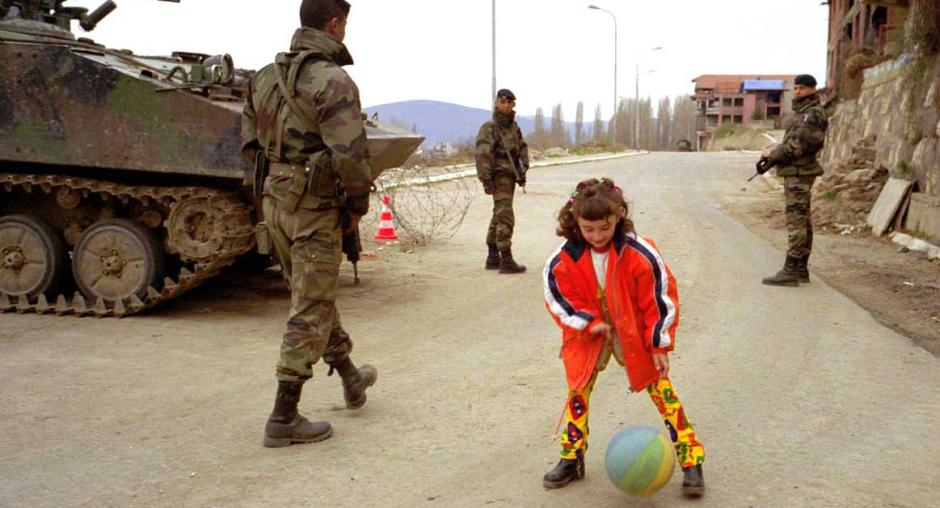Newsroom
Security and access to services remain a concern for minorities in Kosovo
PRISTINA 10 March 2003

Kosovo is still a fragile environment, says a joint OSCE-UNHCR report. (Lubomir Kotek/OSCE) Photo details
PRISTINA, 10 March 2003 - Improvements in the conditions of minority communities remain limited to certain areas in Kosovo or to certain groups, according to the latest OSCE/UNHCR assessment on the situation of minorities. The tenth in this series of joint reports finds that while improvements have been seen in many areas, concerns remain in minorities' essential services, property rights, access to justice and public, civil, and political structures and their security and freedom of movement in Kosovo.
The last report prescribed an approach combining the continued active engagement of UNMIK and other international actors, but as importantly, the firm commitment and strong leadership of the Provisional Institutions of Self-Government at all levels. Kosovo has now had three successful elections and governments elected by the people have been put in place at both the central and municipal levels. Yet fair and equitable access to service by minority communities continues to be problematic.
"The Provisional Institutions of Self-Government have a fundamental role to play in providing protections for minorities against discrimination," said Ambassador Pascal Fieschi, OSCE's Head of Mission in Kosovo. "They must be actively involved and take ownership over the return dynamic, sending visible signs of tolerance to their communities." The report recommends that the OSCE drafted Omnibus Anti-discrimination Law should be passed.
Security, instability and lack freedom of movement still affect minorities' access to services such as education and health care as well as equal employment opportunities. "Kosovo is still a fragile environment in which conditions for the return of internally displaced persons (IDPs) and refugees need to be carefully cultivated," said Walter Irvine, UNHCR's Chief of Mission in Kosovo. "Priority must be placed on the quality and the sustainability of returns in order to effectively lay a solid foundation for a lasting process."
Progress made in 2002 on return of minorities to Kosovo is reviewed in the report, emphasising the importance of a more sustainable community-based approach. "Inter-community dialogue, confidence-building, committed involvement of the local authorities and a bottom-up approach represent key elements for improving the conditions of Kosovo's minorities and to guarantee the return process to occur in safety and dignity," said Mr. Irvine.
"The key challenge now is for the provisional institutions to be inclusive and responsive to the needs of all of its communities. It is important for all communities that make up Kosovo's diverse society to work together for a better future," said Ambassador Fieschi.
Overall the reporting period highlights that changes seen during the reporting period are not yet fundamental enough to conclude that conditions are in place for large scale return of ethnic minorities in the near future, underscoring the continuing need for international protection for members of ethnic minorities in Kosovo.
The report is available in all three languages on OSCE's and UNHCR's websites.
The last report prescribed an approach combining the continued active engagement of UNMIK and other international actors, but as importantly, the firm commitment and strong leadership of the Provisional Institutions of Self-Government at all levels. Kosovo has now had three successful elections and governments elected by the people have been put in place at both the central and municipal levels. Yet fair and equitable access to service by minority communities continues to be problematic.
"The Provisional Institutions of Self-Government have a fundamental role to play in providing protections for minorities against discrimination," said Ambassador Pascal Fieschi, OSCE's Head of Mission in Kosovo. "They must be actively involved and take ownership over the return dynamic, sending visible signs of tolerance to their communities." The report recommends that the OSCE drafted Omnibus Anti-discrimination Law should be passed.
Security, instability and lack freedom of movement still affect minorities' access to services such as education and health care as well as equal employment opportunities. "Kosovo is still a fragile environment in which conditions for the return of internally displaced persons (IDPs) and refugees need to be carefully cultivated," said Walter Irvine, UNHCR's Chief of Mission in Kosovo. "Priority must be placed on the quality and the sustainability of returns in order to effectively lay a solid foundation for a lasting process."
Progress made in 2002 on return of minorities to Kosovo is reviewed in the report, emphasising the importance of a more sustainable community-based approach. "Inter-community dialogue, confidence-building, committed involvement of the local authorities and a bottom-up approach represent key elements for improving the conditions of Kosovo's minorities and to guarantee the return process to occur in safety and dignity," said Mr. Irvine.
"The key challenge now is for the provisional institutions to be inclusive and responsive to the needs of all of its communities. It is important for all communities that make up Kosovo's diverse society to work together for a better future," said Ambassador Fieschi.
Overall the reporting period highlights that changes seen during the reporting period are not yet fundamental enough to conclude that conditions are in place for large scale return of ethnic minorities in the near future, underscoring the continuing need for international protection for members of ethnic minorities in Kosovo.
The report is available in all three languages on OSCE's and UNHCR's websites.
